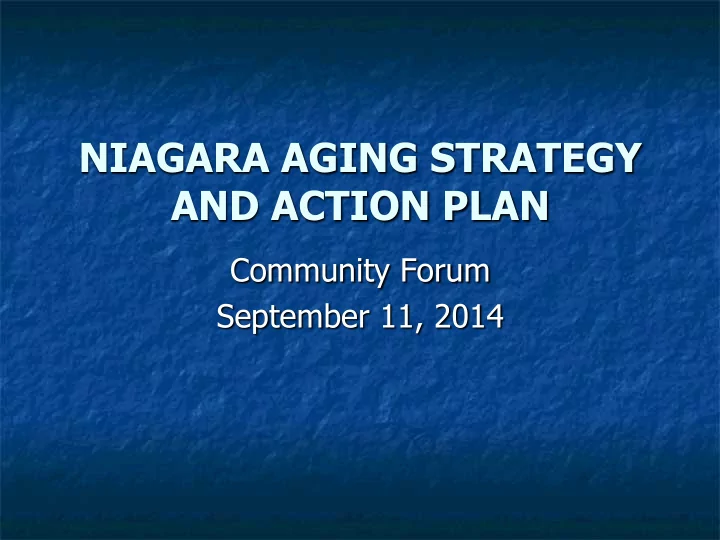

NIAGARA AGING STRATEGY AND ACTION PLAN Community Forum September 11, 2014
AGENDA Morning Afternoon Project Update Goal Setting Environmental Scan Discussion Visioning Next Steps Idea generation Wrap-up by 3:30
PROJECT PROGRESS REPORT April Start-up and information review May Project launch Planning Team meetings June Provider survey Focus groups July/ Key informant interviews Aug. Additional focus groups Data analysis Sept. Community Forum
NEXT STEPS IN WORK PLAN Oct. Planning team meetings Discussion paper issued Nov. Strategy report Dec. Goal mapping Partner recruitment Jan. Implementation planning Finalized toolkit Feb. Sustainability model Final report
DELIVERABLES Comprehensive aging strategy and 1. action plan Tool kit to enable implementation 2. Sustainability model 3.
TARGET GROUPS Based on abilities, not age: Well and fit seniors n Seniors requiring some assistance n with activities of daily living Seniors requiring 24-hour supports n
WHERE WE WENT West Lincoln Thorold Niagara Falls (2) Welland (2) Grimsby St. Catharines Fort Erie Pelham Pt. Colborne Francophones NOTL Chateau Gardens 200+ seniors across 14 sessions
WHAT WE HEARD Transportation Housing Social and Recreational Health Care Community
TRANSPORTATION n Transportation between communities n Expanded public transit n More special transit n Sidewalk and lane improvements n Scooter accessibility n Volunteer, shuttle, pooled driving options n Improved parking n Cost relief
HOUSING n Affordable retirement homes, RGI units n Appropriate housing – type, size, location n Home renovation and maintenance supports n Facilities with a continuum of supports n More LTC facilities close to home n Supportive housing n Transition supports
SOCIAL & RECREATIONAL n More, expanded recreation centres n Youth engagement n Home visiting/outreach n Increased information and awareness
HEALTH CARE n More home care n Transportation to specialized services n Cost relief – dental, vision, hearing n Information and ease of navigation n Dementia care n Mental health supports n Individual advocacy
COMMUNITY n More retail in some areas n Increased involvement of business n Increased youth engagement n Mitigate development n Financial support/cost reduction
SURVEY OF PROVIDERS n Conducted on-line n Quantitative information on needs n 53 replies – high response n Good cross section of services n Comprehensive and thoughtful answers
The Good News: Providers ’ Views = Seniors ’ Views
SYSTEM GAPS Well/Fit Affordable/accessible housing Health education/promotion System navigation Some In-home supports Assistance Special transit Affordable/accessible housing Caregiver supports 24 hour Long-term care beds Support Primary care Special transit
SYSTEM EFFECTIVENESS Poor/Fair Ratings: n Coordination: 91% n Timeliness: 89% n Communicating Information: 71% Source: Survey of Providers
NEW FUNDING: Shopping Spree Housing: 33% Health Care: 28% Transportation: 14% Recreation: 9% Other: 16% Source: Survey of Providers
OBSTACLES AND BARRRIERS Rated as a Major Problem: n Wait lists: 75% n Financial cost: 61% n Transportation: 60% n Lack of awareness of services: 52% Source: Survey of Providers
KEY INFORMANT INTERVIEWS 15 so far, more to come … Corroborating findings from focus groups and provider survey
SWOT ANALYSIS Present: Strengths Weaknesses Future: Opportunities Threats
A “ PREFERRED FUTURE ” September 11, 2020
IDEA GENERATION Ideas to address the SWOT and move us towards our vision n Big or small n Don ’ t discuss or critique n Anything goes!
Breakout Groups 1. Review the data 2. Discuss and expand 3. Create 5 to 7 broad strategies 4. Test against SWOT 5. Prepare report Address local differences
Wrap-up
Recommend
More recommend